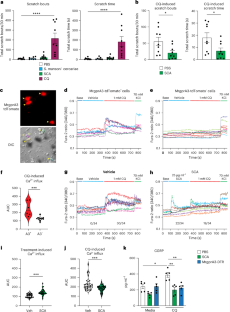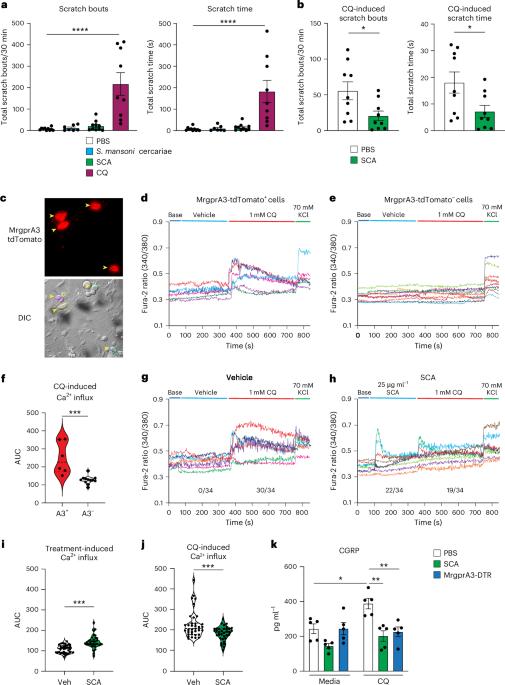MrgprA3神经元通过选择性控制髓源性IL-33驱动皮肤对蠕虫的免疫力
IF 27.7
1区 医学
Q1 IMMUNOLOGY
引用次数: 0
摘要
皮肤利用相互依存的细胞网络来维持屏障完整性和宿主免疫力,但大多数潜在机制仍不清楚。在这里,我们证明了人类寄生蠕虫曼氏血吸虫抑制了小鼠痒感传入所诱发的瘙痒,痒感传入带有与 Mas 相关的 G 蛋白偶联受体 A3(MrgprA3)。MrgprA3神经元通过影响皮肤抗原递呈细胞中细胞因子的表达,控制白细胞介素(IL)-17+ γδ T细胞扩增、表皮增生和宿主对曼氏沙门氏菌的抵抗力。MrgprA3神经元的激活下调了巨噬细胞和2型常规树突状细胞中的IL-33,但部分通过神经肽降钙素基因相关肽诱导了IL-1β和肿瘤坏死因子。暴露于MrgprA3衍生分泌物或带有细胞内IL-33缺失的巨噬细胞显示多个炎症细胞因子位点的染色质可及性增加,促进了表皮的IL-17/IL-23依赖性变化和抗蠕虫性。这项研究揭示了一种以前未被发现的细胞间通信机制,即瘙痒诱导的 MrgprA3 神经元通过引导髓系抗原递呈细胞亚群的细胞因子表达模式,启动宿主对皮肤侵入性寄生虫的免疫。本文章由计算机程序翻译,如有差异,请以英文原文为准。


MrgprA3 neurons drive cutaneous immunity against helminths through selective control of myeloid-derived IL-33
Skin uses interdependent cellular networks for barrier integrity and host immunity, but most underlying mechanisms remain obscure. Herein, we demonstrate that the human parasitic helminth Schistosoma mansoni inhibited pruritus evoked by itch-sensing afferents bearing the Mas-related G-protein-coupled receptor A3 (MrgprA3) in mice. MrgprA3 neurons controlled interleukin (IL)-17+ γδ T cell expansion, epidermal hyperplasia and host resistance against S. mansoni through shaping cytokine expression in cutaneous antigen-presenting cells. MrgprA3 neuron activation downregulated IL-33 but induced IL-1β and tumor necrosis factor in macrophages and type 2 conventional dendritic cells partially through the neuropeptide calcitonin gene-related peptide. Macrophages exposed to MrgprA3-derived secretions or bearing cell-intrinsic IL-33 deletion showed increased chromatin accessibility at multiple inflammatory cytokine loci, promoting IL-17/IL-23-dependent changes to the epidermis and anti-helminth resistance. This study reveals a previously unrecognized intercellular communication mechanism wherein itch-inducing MrgprA3 neurons initiate host immunity against skin-invasive parasites by directing cytokine expression patterns in myeloid antigen-presenting cell subsets. Herbert and colleagues show MrgprA3+ neurons activate myeloid cells to promote cutaneous IL-17-dependent immunity against Schistosoma mansoni.
求助全文
通过发布文献求助,成功后即可免费获取论文全文。
去求助
来源期刊

Nature Immunology
医学-免疫学
CiteScore
40.00
自引率
2.30%
发文量
248
审稿时长
4-8 weeks
期刊介绍:
Nature Immunology is a monthly journal that publishes the highest quality research in all areas of immunology. The editorial decisions are made by a team of full-time professional editors. The journal prioritizes work that provides translational and/or fundamental insight into the workings of the immune system. It covers a wide range of topics including innate immunity and inflammation, development, immune receptors, signaling and apoptosis, antigen presentation, gene regulation and recombination, cellular and systemic immunity, vaccines, immune tolerance, autoimmunity, tumor immunology, and microbial immunopathology. In addition to publishing significant original research, Nature Immunology also includes comments, News and Views, research highlights, matters arising from readers, and reviews of the literature. The journal serves as a major conduit of top-quality information for the immunology community.
 求助内容:
求助内容: 应助结果提醒方式:
应助结果提醒方式:


